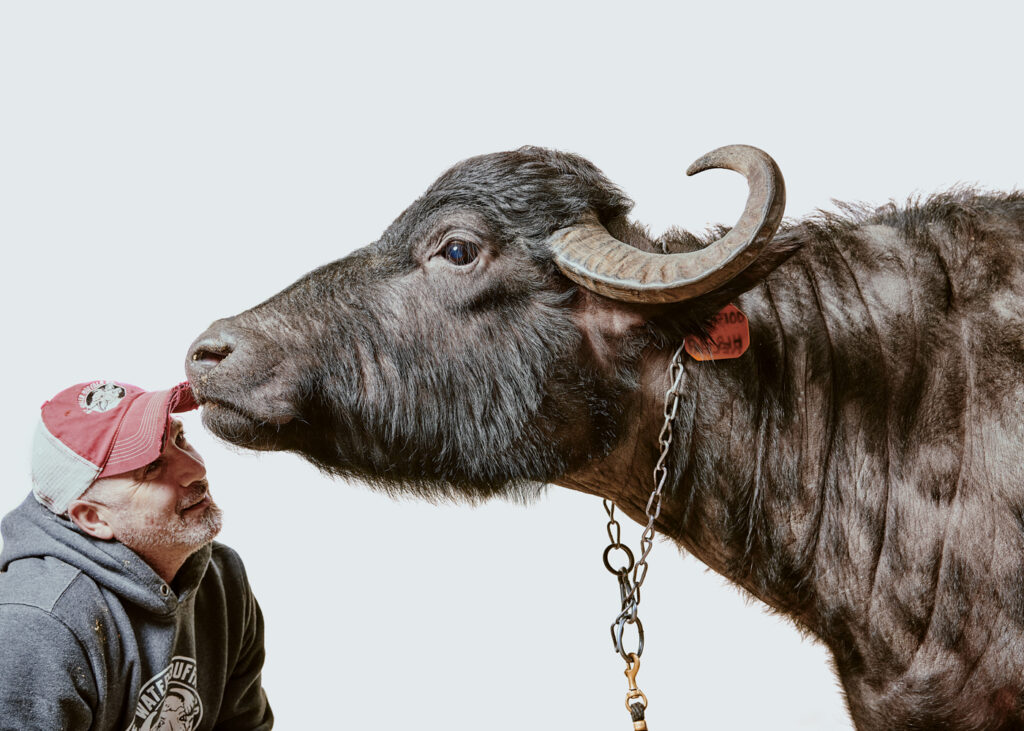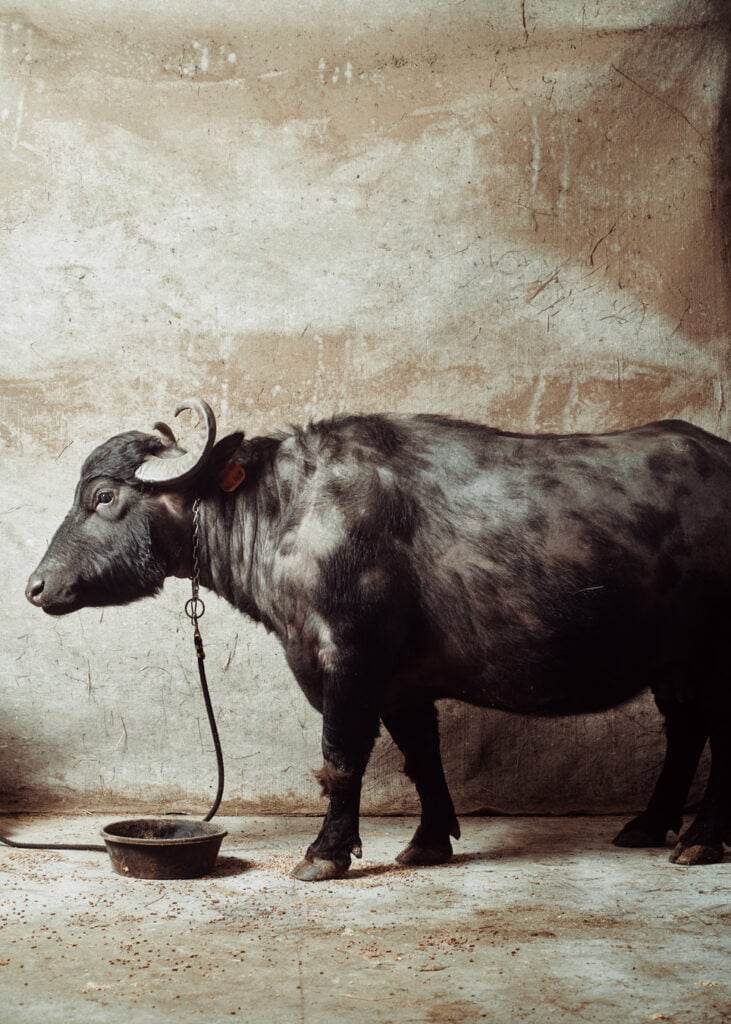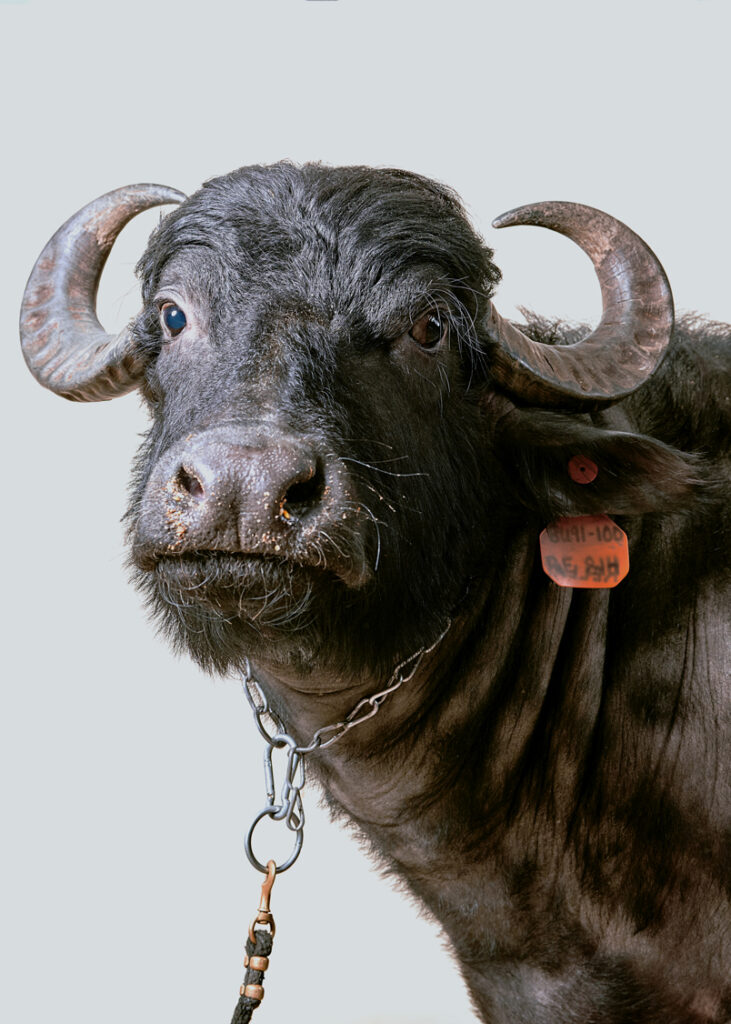By Katy Kelleher
Photographed by Tristan Spinski
Jessica Farrar met her first water buffalo one fateful day in 2008. When she and her three kids visited a farm on the outskirts of Augusta to pick up a pet guinea pig, she noticed a lone, large silhouette in a nearby field. She didn’t know what the animal was, but she recalls, “It was love at first sight.” Something clicked when she looked into its soft eyes. “They were questioning,” she says. “They were curious, knowing, and kind.”
Jessica and her husband, Brian, now own a farm in Appleton where they have raised dozens of water buffalo. Brian has a day job in heating, and Jessica works overtime to run ME Water Buffalo Co. Her days are filled with feeding (the 18-acre farm provides the herd a mixture of hay and grass, and the “milking girls” get a bit of sweetened grain while in the parlor “as a treat”), milking (a single water buffalo produces around a gallon per session), and making dairy products like cheese and gelato. Sometimes, she accompanies one of her beloved animals to the slaughterhouse, because the farm sells meat too. “I will say, there have been water buffalo I’ve shed tears over,” she admits. “But I stay with them until the last minute. I make sure they know they’re loved.”
The Farrars currently have a herd of 10, and Jessica is working on buying more water buffalo. A few years ago, they had a herd of 27, all of which they sold, along with their farm. “For a while, we got out,” Jessica says. “That lasted eight months. I felt too lost.” They had more free time and more money in the bank than they’d had in years, but she missed the work — and she missed those soft eyes.
But such niche farming is still difficult to sustain, so Jessica has had to get creative. “Our main goal right now is to do more with agritourism,” she says. Among her plans for the farm: open-to-the-public “calf-cuddling days” and wood-fired pizza dinners, topping doughs with her water-buffalo mozzarella. Not only do people like to see the animals, but also the animals really like to see people. “Their temperament is so engaging,” Jessica says, stroking one of them on the forehead. “They love the attention.”



Buffalo Bites
Milk
Water-buffalo milk has twice the amount of solids as cow’s milk and a higher fat content (a water buffalo produces milk with 8.5 percent butterfat compared to 3.5 percent from a Holstein cow). The milk is creamy, high in calcium, and a little bit sweeter than cow milk. However, they only sell water-buffalo milk during the slow winter months, because every drop goes into other products in the summer.
Cheese
“If you squeeze a good water-buffalo mozzarella ball, you get this creamy, juicy milk that oozes out,” Jessica says. “It’s so much better than bland, rubbery grocery-store cheese.” Italian cheesemakers typically use water-buffalo milk in their mozzarella, and if you’ve eaten a Caprese salad abroad, you know the decadent taste. The Farrars also make burrata (squishy mozzarella balls filled with full-fat cream), dry-salted feta, fromage blanc, and ricotta.
Meat
The meat is “very lean, and very heart-healthy,” Jessica says. It tends to be low in cholesterol and saturated fat, high in protein. Jessica compares the taste to moose meat. For anyone who hasn’t eaten moose, think somewhere between venison and beef.
Gelato
In addition to seasonal flavors, the Farrars always stock four gelato flavors — mint chocolate chip, chocolate, fior di latte, and coffee. Jessica’s favorite is the simplest offering, the fior di latte. “It’s like vanilla, but without the vanilla,” she says. “It’s a three-ingredient gelato: water-buffalo milk, cane sugar, and organic corn starch.”
The farm store is typically open Saturdays 10 a.m.–2 p.m., but reach out to verify hours or to ask about preorders and pickups. Products are also at specialty shops, including Camden’s Megunticook Market, Freeport’s Bow Street Market, Vinalhaven’s Island Spirits, and Brunswick’s Morning Glory. 232 Old County Rd., Appleton. 207-785-6493. mewaterbuffaloco.co







